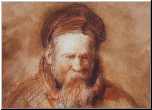AriusThalia(excerpt quoted by Athanasius, De Synodis, Part II, Chapter 15) God Himself then, in His own nature, is ineffable by all men. Equal or like Himself He alone has none, or one in glory. And Ingenerate we call Him, because of Him who is generate by nature. We praise Him as without beginning because of Him who has a beginning. And adore Him as everlasting, because of Him who in time has come to be. The Unbegun made the Son a beginning of things originated; and advanced Him as a Son to Himself by adoption. He has nothing proper to God in proper subsistence. For He is not equal, no, nor one in essence with Him. Wise is God, for He is the teacher of Wisdom. There is full proof that God is invisible to all beings; both to things which are through the Son, and to the Son He is invisible. I will say it expressly, how by the Son is seen the Invisible; by that power by which God sees, and in His own measure, the Son endures to see the Father, as is lawful. Thus there is a Triad, not in equal glories. Not intermingling with each other are their subsistences. One more glorious than the other in their glories unto immensity. Foreign from the Son in essence is the Father, for He is without beginning. Understand that the Monad was; but the Dyad was not, before it was in existence. It follows at once that, though the Son was not, the Father was God. Hence the Son, not being (for He existed at the will of the Father), is God Only-begotten, and He is alien from either. Wisdom existed as Wisdom by the will of the Wise God. Hence He is conceived in numberless conceptions: Spirit, Power, Wisdom, God’s glory, Truth, Image, and Word. Understand that He is conceived to be Radiance and Light. One equal to the Son, the Superior is able to beget; but one more excellent, or superior, or greater, He is not able. At God’s will the Son is what and whatsoever He is. And when and since He was, from that time He has subsisted from God. He, being a strong God, praises in His degree the Superior. To speak in brief, God is ineffable to His Son. For He is to Himself what He is, that is, unspeakable. So that nothing which is called comprehensible does the Son know to speak about; for it is impossible for Him to investigate the Father, who is by Himself. For the Son does not know His own essence, For, being Son, He really existed, at the will of the Father. What argument then allows, that He who is from the Father should know His own parent by comprehension? For it is plain that for that which hath a beginning to conceive how the Unbegun is, or to grasp the idea, is not possible. Letter of Arius(excerpt quoted by Athanasius, De Synodis, Part II, Chapter 16) To Our Blessed Pope and Bishop, Alexander, the Presbyters and Deacons send health in the Lord. Our faith from our forefathers, which also we have learned from thee, Blessed Pope, is this:—We acknowledge One God, alone Ingenerate, alone Everlasting, alone Unbegun, alone True, alone having Immortality, alone Wise, alone Good, alone Sovereign; Judge, Governor, and Providence of all, unalterable and unchangeable, just and good, God of Law and Prophets and New Testament; who begat an Only-begotten Son before eternal times, through whom He has made both the ages and the universe; and begat Him, not in semblance, but in truth; and that He made Him subsist at His own will, unalterable and unchangeable; perfect creature of God, but not as one of the creatures; offspring, but not as one of things begotten; nor as Valentinus pronounced that the offspring of the Father was an issue; nor as Manichæus taught that the offspring was a portion of the Father, one in essence; or as Sabellius, dividing the Monad, speaks of a Son-and-Father; nor as Hieracas, of one torch from another, or as a lamp divided into two; nor that He who was before, was afterwards generated or new-created into a Son, as thou too thyself, Blessed Pope, in the midst of the Church and in session hast often condemned; but, as we say, at the will of God, created before times and before ages, and gaining life and being from the Father, who gave subsistence to His glories together with Him. For the Father did not, in giving to Him the inheritance of all things, deprive Himself of what He has ingenerately in Himself; for He is the Fountain of all things. Thus there are Three Subsistences. And God, being the cause of all things, is Unbegun and altogether Sole, but the Son being begotten apart from time by the Father, and being created and founded before ages, was not before His generation, but being begotten apart from time before all things, alone was made to subsist by the Father. For He is not eternal or co-eternal or co-unoriginate with the Father, nor has He His being together with the Father, as some speak of relations, introducing two ingenerate beginnings, but God is before all things as being Monad and Beginning of all. Wherefore also He is before the Son; as we have learned also from thy preaching in the midst of the Church. So far then as from God He has being, and glories, and life, and all things are delivered unto Him, in such sense is God His origin. For He is above Him, as being His God and before Him. But if the terms ‘from Him,’ and ‘from the womb,’ and ‘I came forth from the Father, and I am come’ (Rom. xi. 36; Ps. cx. 3; John xvi. 28), be understood by some to mean as if a part of Him, one in essence or as an issue, then the Father is according to them compounded and divisible and alterable and material, and, as far as their belief goes, has the circumstances of a body, Who is the Incorporeal God. (Deposition of Arius, Alexander of Alexandria, Section 2). Now those who became apostates are these, Arius, Achilles, Aeithales, Carpones, another Arius, and Sarmates, sometime Presbyters: Euzoius, Lucius, Julius, Menas, Helladius, and Gaius, sometime Deacons: and with them Secundus and Theonas, sometime called Bishops. And the novelties they have invented and put forth contrary to the Scriptures are these following:— God was not always a Father, but there was a time when God was not a Father. The Word of God was not always, but originated from things that were not; for God that is, has made him that was not, of that which was not; wherefore there was a time when He was not; for the Son is a creature and a work. Neither is He like in essence to the Father; neither is He the true and natural Word of the Father; neither is He His true Wisdom; but He is one of the things made and created, and is called the Word and Wisdom by an abuse of terms, since He Himself originated by the proper Word of God, and by the Wisdom that is in God, by which God has made not only all other things but Him also. Wherefore He is by nature subject to change and variation as are all rational creatures. And the Word is foreign from the essence of the Father, and is alien and separated therefrom. And the Father cannot be described by the Son, for the Word does not know the Father perfectly and accurately, neither can He see Him perfectly. Moreover, the Son knows not His own essence as it really is; for He is made for us, that God might create us by Him, as by an instrument; and He would not have existed, had not God wished to create us. Accordingly, when some one asked them, whether the Word of God can possibly change as the devil changed, they were not afraid to say that He can; for being something made and created, His nature is subject to change. |


